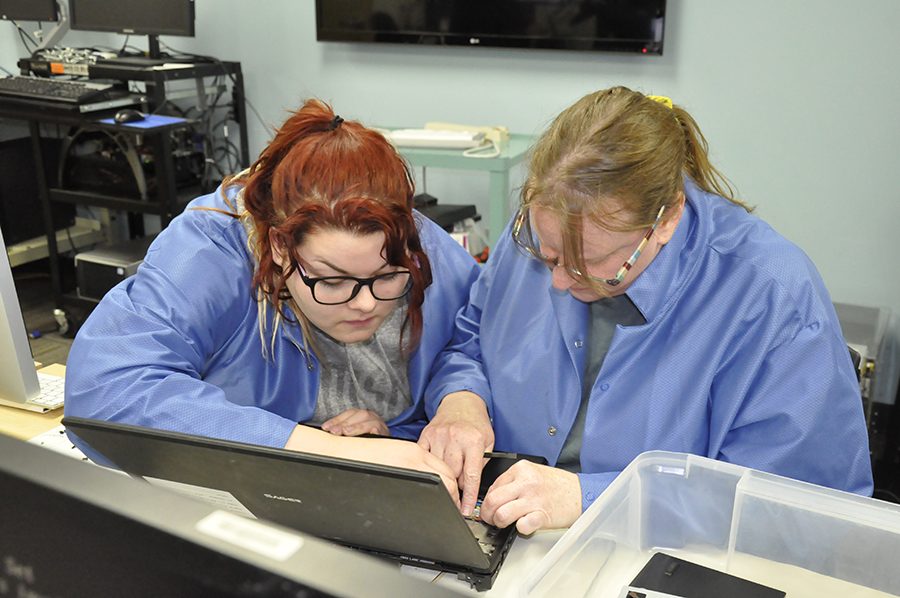Passion for technology enables women to succeed in what was once considered a traditionally male field
Members of the Madison College WolfPack Techies work to troubleshoot potential computer problems.
January 16, 2018
The WolfPack Techies do more than just fixing computers. According to Lana McCarthy, the Senior Lab Planner of the Techies, they “save worlds.”
Though women in the fields of technology are just as able to save the worlds of others with their IT skills, they are often treated differently.
McCarthy explains that in IT, “The vast majority of the people that you’ll work with are guys. And even with all the advancements we’ve had, there is still a lot of stereotyping.”
Kaylena Birmingham simply replied with the word “tough,” paired with a deep sigh when asked what it was like to be a woman in IT.
Before graduating this winter, Birmingham was a level three technician at the WolfPack Techies, which is the highest level a technician can be. In the fall semester, Birmingham put over 200 hours of work into repairing computers for the Techies. Despite her level of knowledge and experience, she has still encountered some male colleagues second guessing her opinions.
“There are a lot of guys who won’t listen to you because they think you don’t know as much as they do.”
“For instance, there was a technician working on a computer, and they couldn’t figure out why it wasn’t charging,” even though they had replaced the battery, and the computer still wasn’t holding a charge.
Birmingham suggested that “It’s probably the charging brick,” that was the issue, but the other technician disagreed.
“So I went in the back, grabbed another one we had in spares, and plugged it in. It started working, and they were like, ‘Oh, ok!’ and gave me a high five. And I was like ‘I told you, why didn’t you listen to me?’ It was like, a whole hour before they figured it out.”
Women in IT and tech fields often have to deal with not being listened to.
“If you give an opinion, it’s not always taken into account right away,” explains McCarthy. “You have to make yourself heard.”
Bias against women in tech and IT fields can even mean that “(women) can get over looked for positions,” explains McCarthy.
Though it can be challenging to be a woman in IT, both McCarthy and Birmingham are passionate about the field.
For Birmingham, she enjoys IT because there is always something new to learn, and is passionate about it because it givers her the chance to problem solve.
“You are always a student if you are in IT,” explains Birmingham.
“I think of IT as like a puzzle, and I love puzzles.” “It’s like ‘how can I make all of this stuff work together?’”
Though it can be challenging to be a woman in IT, both McCarthy and Birmingham think that it shouldn’t keep women away from the field.
If you ask McCarthy why women should enter the career, she will exuberantly answer, “Because it’s fun!”
There are also other aspects that McCarthy thinks should draw women into the field.
“On a purely economic level, IT jobs pay very well. I would like to see more women into it so they can take advantage of that, and become managers,” explains McCarthy.
Though McCarthy wants more women in IT, she understands why many women feel nervous when beginning their IT degrees.
When she began her degree in IT at Madison College, she remembers thinking to herself “Oh, there’s like no other women in the classroom … And then you realize, ‘Oh, all of my instructors are predominantly men.”
“It was intimidating at first. And I think it will be for all women, they just have to view it as a challenge they have to do, and go on, and keep going.”
One thing that McCarthy thinks could help women entering the IT field is having women mentors to guide them.
“If you can have a mentor to go to, somebody who will say ‘Yeah, I understand, and this is how I got through it.’”
McCarthy often acts as a mentor for the women who work at the WolfPack Techies.
“I try to bring women in here and mentor them, and give them a little extra help, because I want to see them succeed.”
“Somehow we have to make it comfortable for them to be there. I’m not saying it isn’t now, but more comfortable, more encompassing, so they can think ‘yeah, I can do this.’ I think we have made a lot of progress for that, but I still think we have ways to go.”































